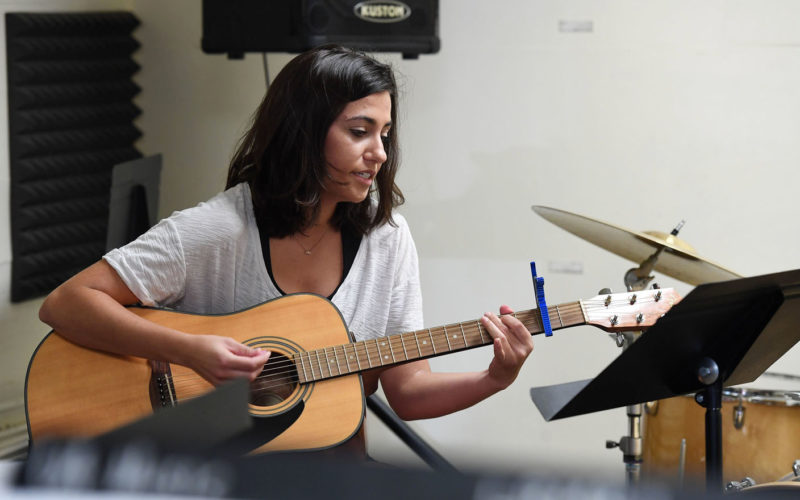UA adds jazz to degree programs
MARY JORDAN
mjordan@nwadg.com
A new program at the University of Arkansas is making music history.
The Department of Music in the J. William Fulbright College of Arts and Sciences is offering a bachelor of music degree with a concentration in jazz studies for the first time, said Jake Hertzog, senior guitar instructor and jazz area coordinator.
The university began including jazz performance courses in its curriculum in 2016, but Hertzog said isolated jazz courses and performance ensembles have been offered on campus for several decades.
“There was enough of that going on that the faculty as a whole felt like we’d like to add some kind of a jazz program more formally,” he said.
The university typically has 225-250 undergraduates and 35 graduate students seeking degrees in the Music Department, said Ronda Mains, department chairwoman.
“We expect to have about 20 enrolled in the jazz emphasis this semester,” she said. “I expect this to grow as word gets out.”
Pursuing jazz
Educators can prepare students for careers in music through the new degree program, Hertzog said.
“We have a special opportunity that we can start with a very contemporary way of trying to think about it and imagine what all of our definitions of student success and opportunities are going to be,” he said.
Jordan Strickland, 22, of Rogers was so attracted to the idea of pursuing a degree with an emphasis in jazz studies he switched his emphasis from music education to jazz this year.
Strickland is a senior who graduated from Rogers High School in 2016.
He spent much of his summer performing with his groove-based band the Honey Collective, which he formed with fellow University of Arkansas music student Walter Ferguson of Fayetteville.
“I decided that I really wanted to pursue a career in producing and performing music, so I figured it would be best to switch over,” Strickland said of changing his emphasis.
Ferguson said he’s been exploring the new jazz courses.
“It’s definitely shown me a bunch of different opportunities and genres of music that I wouldn’t have normally been exposed to,” he said.
Ferguson is a music education major who’s in his junior year. He graduated from Fayetteville High School in 2017.
Developing musicians
Offering the jazz track at the university level is particularly important for developing the next generation of musicians, said Robert Ginsburg, founder of Northwest Arkansas Jazz Society.
The society is a nonprofit group whose mission is to present, preserve, promote and celebrate jazz through education, concert presentations and artist promotion.
“It’s significant because that’s the level at which you develop a passion that will sustain you throughout your life,” Ginsburg said of studying jazz in college.
Many high schools don’t offer jazz education and put an emphasis on concert or marching bands, he said.
“The momentum is behind the marching bands, because the momentum is behind football,” he said. “Particularly in Northwest Arkansas.”
Ferguson said Fayetteville High School didn’t have a jazz program when he attended. Strickland said Rogers High did.
Fayetteville High has had a jazz band in the past, but there wasn’t enough student interest two years ago to offer it, said Barry Harper, band director.
“In the meantime, we started to encourage our serious jazz students to participate in a new program provided by the Walton Arts Center,” Harper said. “The Northwest Arkansas Jazz All Stars is for area high school students, and they meet weekly with some of the best jazz instructors in Arkansas.”
Fayetteville High has students participating in the group, and Harper plans to see if a jazz program can be started next year at the school.
The lack of exposure to jazz in high school is what led him to begin exploring the genre in college, Ferguson said.
“It’s just so much more free and so much more creative,” he said. “It just seems so much more musical than other types of genre. As a musician, I think it gives you the most ability to experiment with what it is to be a musician and what you can do.”
The university’s work to establish a jazz degree track is long overdue, said Jay Shepherd with Arkansas Jazz Educators. Shepherd lives in Fort Smith and works with Fort Smith Public Schools. Arkansas Jazz Educators works to foster and promote an understanding and an appreciation of jazz, he said.
The skills university students can learn about jazz may be integral to their creativity and development as artists, he said.
“The way that jazz works is you must learn to be creative and create music on the spur of the moment,” he said. “That makes the concepts and the musical skills that you learn so much more real because you have to apply and use them.”
The jazz program is just one more way the university can help create musicians who can take on any kind of music career, Hertzog said.
“The 21st century musician will be well prepared to be creative, perform, research at a high level and is going to be the one that is exposed to as many kinds of music as possible,” he said.
Building awareness
Helping more students discover what the university offers in jazz education will take a concentrated effort, Hertzog said.
“Programmatically, we’d like to see our ensemble numbers increase and expand,” he said.
Hertzog said the university has left some room for growth in the program so it could add performance ensembles and advanced classes in music improvisation.
“We’d like to see that fill out as we recruit and bring folks in,” he said.
Introducing jazz at the university level will have ripple effects on the community, Hertzog said. The development is in keeping with regional efforts to grow the music scene, he said.
“In our role as a university music program, helping to provide that critical mass of musicians, artists and talent that gets pumped into that scene and into that economy, that’s definitely a good thing,” he said.
“To really serve our students and our music community, we need to be giving them greater and greater options for the kinds of music to study and the integration of that music.”
__
FYI
Ensembles
The University of Arkansas Department of Music offers a variety of ensembles it considers jazz-related.
• UA Jazz Orchestra is the oldest jazz ensemble on campus. As a big band, the orchestra performs standards and pushes the boundaries with new compositions and arrangements, many by the faculty.
• Jazz Combos work with faculty members and students. Combos are formed based on need and performance is student driven.
• Latin American Ensemble performs music from Afro-Caribbean and Latin American traditions. The ensemble explores the music of one of the most culturally diverse regions in the world.
• World Music Ensemble uses improvisation to explore many cultures. The ensemble uses folk and western instruments in performing music from Africa, Asia, and the Americas.
• Songwriter’s Ensemble brings musicians and lyricists together to create songs in contemporary music.
• Arkansas Soul Band performs standards from soul, R&B, funk and the blues. Vocalists and instrumentalists partner to perform favorites in contemporary music.






